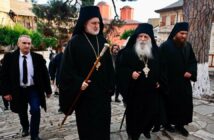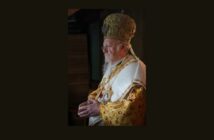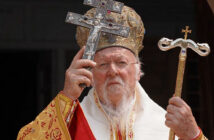Source: Orthodox Times

Patriarch Bartholomew’s visit to Mount Athos in May 2022
“The monks are not above the church, or despite the church, but within the church, and even as its chosen constitution,” stressed Ecumenical Patriarch Bartholomew, during his visit to the Karakallou Monastery on Mount Athos yesterday afternoon, calling on the monks to preserve the “basic and undeniable truths” of the apostolic teaching, against “temptations” and “voices” that lead in the opposite direction to the imposed unity and functionality of the church.
“Unfortunately, on two occasions, for example, the concession of autocephaly to the Church of Ukraine and the coronavirus pandemic, voices are heard, sadly and bitterly said from the lonely place, which challenge and overturn the whole holy and spiritual structure of the church,” said Bartholomew.
He added that these “voices” “unleash insults and slander against the church, and, exceptionally, against the Mother and Great Church of Christ” and regretted this, saying: “Monasticism is ecclesiastical and not private…
In the church we are not saved alone…
The tradition and actions of our Orthodox Eastern Church are on the subject universal, otherwise we are diverted to a misguided ecclesiology …
“Those who lightly teach contrary to what the Church, with the fear of God, faith and love, prudence, prayer, lighting and much effort and agony, take on a heavy responsibility,” the Ecumenical Patriarch continued.
He added: “Have confidence in the Church. The Spirit, the Holy, constituted the institution of the church and led it to all Truth. ”
Ecumenical Patriarch Bartholomew explained that the church is, according to the apostolic teaching, the body of Christ “that is, a whole and an organization that is unified and indivisible, to which the members cannot be excused from each other and from themselves, which is led and ruled by Jesus Christ himself” and added: “Any resignation from the apostolic teaching constitutes a dangerous alteration of Orthodox ecclesiology – we should not forget that all heresies start from an incorrect ecclesiology.
The distorted and scholarly ecclesiology means, in the final analysis, deviating dogmatic faith about Christ, that is, heresy.
Ecumenical Patriarch Bartholomew also underlined that the relationship between the Ecumenical Patriarchate and Mount Athos is “ontological” and “ecclesiastical” and the commemoration of the Ecumenical Patriarch is a recognition of this unity and functionality of the church, from which the monks are not excluded, while the slightest deviation from this “harmony and coupling” leads to the “self-default” of monasticism.
“The act of commemorating the Patriarch with the most simple and common : “First remember, Lord, our Archbishop “continually reveals this, that the Bishop of the place (Mount Athos) is always the Archbishop of Constantinople, so as to preserve the unity and functionality of the body of Christ, that is, the church,” stressed Metropolitan Bartholomew and continued: “The charismatic order of the monks is in no way excluded from this functional unity of the body, as well as the slightest deviation from its harmony and conjugation, would be a self-reflection of monasticism.”
The Ecumenical Patriarch pointed out that “the dangers and temptations for the monk are many”, such as “to be held responsible contrary to his dedication to Christ” and underlined that “the preoccupations of the monks with the individual ecclesiastical events, without the invitation of local bishops and even intense and warm, are reprehensible”, because they can bring about “problems, judgments, criticism, turmoil and dissension” and added:
“It is not the work of the monk to act in parallel with the local church.
The monk teaches, illuminates and sanctifies his surroundings with his consistent life with struggles, repentance, tears, exercise, silence, obscurity, ceaseless prayer. ”



